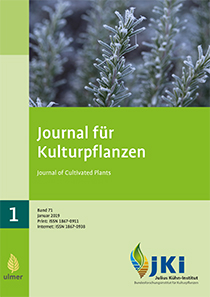Impacts of PGPR, compost and biochar of Azolla on dry matter yield, nutrient uptake, physiological parameters and essential oil of <em>Rosmarinus officinalis</em> L.
DOI:
https://doi.org/10.5073/JfK.2019.01.01Keywords:
Rosemary, Photosynthetic pigments, Carbohydrates, Flavonoides, Prolin, Essential oilAbstract
Rosemary is one of the most important medicinal plants. In order to study the effect of plant growth promoting rhizobacteria (PGPR), Azolla compost and Azolla biochar on dry matter, nutrient uptake, physiological parameters and essential oil of rosemary, a greenhouse experiment was conducted in a completely randomized design with 6 replications. Treatments consisted of T1 (control), T2 (1% (1 g 100 g-1 dry soil) Azolla compost), T3 (1% Azolla biochar), T4 (PGPR (P. fluorescens)), T5 (1% compost + PGPR) and T6 (1% biochar + PGPR). Results indicated a significant enhancement of dry matter, nutrient uptake, photosynthetic pigments, carbohydrate, flavonoid and essential oil contents of rosemary influenced by organic fertilizers compared to control, particularly with co-application of PGPR + compost or biochar. Proline content decreased in all treatments in comparison with control. Results indicated positive impacts of PGPR, compost and boichar of Azolla on rosemary production by increasing nutrient uptake and protecting chlorophyll from degradation and enhancing its content in leaves.
DOI: 10.5073/JfK.2019.01.01, https://doi.org/10.5073/JfK.2019.01.01
Published
Issue
Section
License
The content of the journal is licensed under the Creative Commons Attribution 4.0 License. Any user is free to share and adapt (remix, transform, build upon) the content as long as the original publication is attributed (authors, title, year, journal, issue, pages).
The copyright of the published work remains with the authors. The authors grant the Journal of Cultivated Plants, the Julius Kühn-Institut and the OpenAgrar repository the non-exclusive right to distribute and exploit the work.







